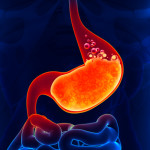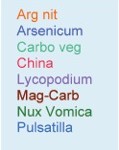21 Feb Indigestion
Oh no! You’ve got indigestion again. It’s that terrible pain in your chest that always makes you think you are having a heart attack. Or that horrible feeling of fullness that means you can’t consider bending over. Or that embarrassing belching and a bad taste in your mouth. Whatever it is, it probably comes from a faulty upper digestive tract.
It’s not surprising that it feels so awful because digestion is a complex system, mixing your food with enzymes that require strong alkaline and then strong acid solutions to work. So you’re dealing with a chemistry set. The acid in your stomach can be as low as 1 or 2 on a ph scale and that is very acidic.
What is causing it?
- Well, if it is heartburn, it is leaky stomach valve at the bottom of the oesophagus letting acid escape upwards.
- If the pain is actually in your stomach and is coming on right after you eat, it might be too much acid due to eating too much fatty food.
- If your stomach becomes and remains uncomfortably full, it could be due to insufficient acid which can be caused by wolfing your food too quickly, not chewing it sufficiently, a food sensitivity, drinking too much when eating or stress.
- If you are burping, this could have the same cause as above: your stomach has slowed or stopped its contraction and churning so that your food is ill-digested and producing gas that has to escape upwards.
- If you have bloating or farting, it is probably something not working well beyond the stomach level of your digestive system. Perhaps it is an inability to digest certain foods well (think milk or wheat or gluten) or your large intestine is not processing your stool as it should (either too fast or too slowly).
Reasons
Eating too fast can reduce the flow of digestive juices or you may not have sufficient saliva mixed with your food to start the digestion of carbohydrates.
Eating too much fat causes more acid to be produced in the stomach.
Eating too much means that your stomach will empty more slowly and encourages acid reflux.
Eating foods that you are sensitive to (often milk products, wheat or gluten) causes production of gas as your body tries to deal with something it can’t tolerate well.
Eating in the wrong order causes delays in digestion leading to foods being retained in the stomach that are quickly digested and so begin to ferment. For instance, fruits are digested quickly and should be eaten 15 minutes before proteins or they will be stuck in the stomach fermenting and causing gas.
Stress, anxiety and worry will affect the digestive system, too, causing it to malfunction. We all know this on a short-term basis because we’ve experienced getting the runs before a big exam, interview or performance. But lower level, long-term stress will have an impact on the functioning of your digestive chemistry set, too.
So what can you do?
You can take antacids from a pharmacy. Antacids are medicines that can relieve symptoms of indigestion because they neutralise acid in your stomach. However, they usually contain aluminium so I’d avoid them. They work quickly but usually only briefly.
If antacids don’t work, you might be prescribed H2 receptor antagonists (H2RAs) or Proton Pump Inhibitors which both work by reducing your stomach acid. But this interferes with the digestive process altogether.
Not for you? The good news …
This is one of the things that I write about where I am saying ‘give it a go and treat yourself’.
Click on the box here if you want to see if any of these common remedies fit the bill for you. If not, you can take a look at how to choose your remedy by clicking here. Failing both of these options, please click here to make an appointment to get it sorted with homeopathy.
The buts
(yes, there are always buts)
Simple indigestion should be easy to treat. If you don’t get a good result, please go and see your homeopath.
Don’t even consider treating it yourself if you have any of the following as well: unexplained weight loss, difficulty swallowing, blood in your stool, vomiting, difficulty breathing, you’ve got a family history of bad indigestion. If someone has sweating and palpitations with severe chest pain, call an ambulance.
Other things to try:
If you don’t have access to any remedies right now you could try any of the following:
Immediately, you can:
- Drink peppermint tea or suck a peppermint sweet
- Chew caraway, cardamom or fennel seeds
Please tell us in a comment if you have any other home remedies you find work for indigestion.
In the longer term, you should consider:
- Losing excess weight.
- Keeping a food diary to track what you eat and your symptoms and cut down.
- Not smoke.
- Drinking less alcohol.
- If you get heartburn at night, sleeping in a more upright position.
- Not eating less than three hours before going to bed.
- Trying to reduce your stress levels.
- Not eating too much or too quickly.
Chronic, long-lasting or frequently occurring indigestion is a sign that something is not working as it should. Left untreated, repeated heartburn can cause irritation of the oesophagus which can lead to cancer. Too much acid production in the stomach can cause peptic ulcers so don’t ignore the symptoms.




Sorry, the comment form is closed at this time.